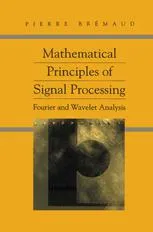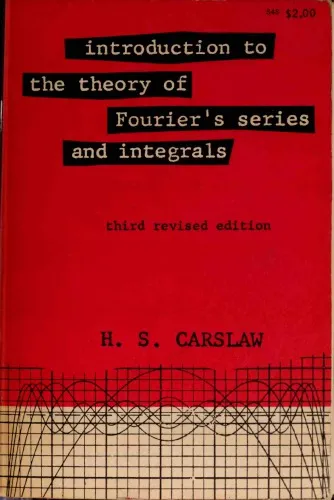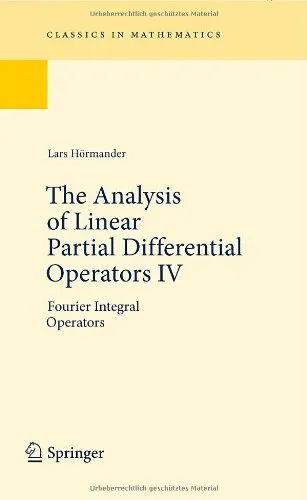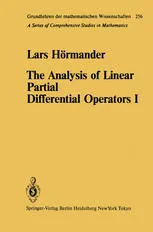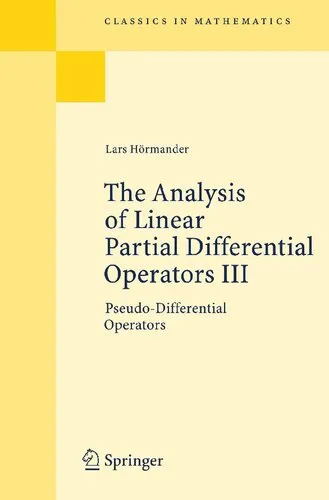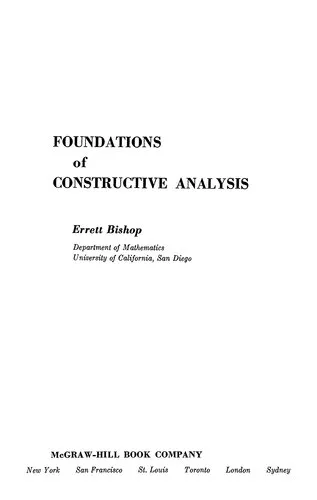Mathematical Principles of Signal Processing: Fourier and Wavelet Analysis
4.3
بر اساس نظر کاربران

شما میتونید سوالاتتون در باره کتاب رو از هوش مصنوعیش بعد از ورود بپرسید
هر دانلود یا پرسش از هوش مصنوعی 2 امتیاز لازم دارد، برای بدست آوردن امتیاز رایگان، به صفحه ی راهنمای امتیازات سر بزنید و یک سری کار ارزشمند انجام بدینکتاب های مرتبط:
معرفی کتاب
کتاب "Mathematical Principles of Signal Processing: Fourier and Wavelet Analysis" نوشته پیر برمود، یکی از منابع مهم در زمینه تحلیل سیگنال است که مفاهیم پایه ریاضی و تکنیکهای مدرن پردازش سیگنال از جمله تحلیل Fourier و Wavelet را بررسی میکند. این کتاب به کمک دیدگاههای دقیق ریاضی و مثالهای کاربردی، به درک بهتر پردازش سیگنال کمک میکند.
خلاصهای از کتاب
این کتاب به بررسی اصول ریاضی پردازش سیگنال و تحلیل دقیق تکنیکهای Fourier و Wavelet میپردازد. در ابتدا، مفاهیم پایه پردازش سیگنال شامل توابع و سریهای Fourier معرفی میشوند. سپس به پردازش سیگنال در حوزه زمان و فرکانس پرداخته شده و تکنیکهای جدیدتری مانند تحلیل Wavelet مورد بررسی قرار میگیرد. این کتاب همچنین به تشریح روشهای محاسباتی و الگوریتمهای موجود برای تسهیل در اجرای تکنیکهای ذکر شده میپردازد.
نکات کلیدی کتاب
- درک عمیق از تحلیل سیگنال و اهمیت آن در علوم و مهندسی
- معرفی کامل و جامع از تحلیل Fourier و کاربری آن در پردازش سیگنال
- ارائه مفاهیم بنیادی و کاربردی در تحلیل Wavelet
- روشهای محاسباتی و الگوریتمهای موثر در تحلیل سیگنال
جملات معروف از کتاب
"Signal processing is not about magic; it's about mathematics, pure and simple."
"Fourier and Wavelet transformations are not choices, they are companions in the journey of signal exploration."
چرا این کتاب اهمیت دارد
این کتاب برای دانشجویان، محققان و متخصصانی که در زمینههای مربوط به پردازش سیگنال کار میکنند، ضروری است. با استفاده از این منبع، خوانندگان میتوانند مهارتهای لازم برای تحلیل دقیق و کاربرد سیگنالهای مختلف را فرا بگیرند. با پوشش تکنیکهای Fourier و Wavelet، کتاب به یک رفرنس جامع برای درک و استفاده از روشهای پیشرفته پردازش سیگنال تبدیل شده است.
علاوه بر این، این کتاب به دلیل ارائه مثالهای کاربردی و روشهای محاسباتی موثر، نه تنها در آموزش عالی بلکه در صنعت نیز میتواند مورد استفاده قرار گیرد. به همین دلیل، مطالعه این کتاب به خوانندگان کمک میکند تا توانایی خود را در حل مسائل پیچیده در حوزه پردازش سیگنال افزایش دهند.
Introduction to "Mathematical Principles of Signal Processing: Fourier and Wavelet Analysis"
Signal processing is a cornerstone of modern engineering and technology, offering critical methods for analyzing and interpreting data across various domains. "Mathematical Principles of Signal Processing: Fourier and Wavelet Analysis" provides a thorough exploration of the mathematical concepts underlying these processes.
Detailed Summary of the Book
In this book, "Mathematical Principles of Signal Processing: Fourier and Wavelet Analysis," Pierre Brémaud delves into the fundamental mathematical techniques that form the backbone of signal processing. The book comprehensively covers both Fourier and wavelet analyses, offering a robust framework for solving problems related to signal handling and manipulation.
The book begins with an introduction to signals and their representations, progressing through the intricacies of Fourier series and transforms. Fourier analysis is presented as a powerful tool in understanding periodic signals, and the reader is introduced to discrete Fourier transforms and their applications in digital signal processing.
One of the standout features of this book is its detailed treatment of wavelet analysis. With the increasing importance of wavelets in diverse fields, Brémaud explains their utility in analyzing non-stationary signals. The text elucidates how wavelets resolve limitations posed by traditional Fourier methods, providing a concise treatment of topics such as multiresolution analysis and wavelet transforms.
Throughout the book, emphasis is placed on developing solid mathematical foundations, ensuring that readers gain not just procedural knowledge, but the conceptual understanding necessary to innovate and apply these techniques in varied contexts. The author integrates theory with practical examples, facilitating an engaging learning experience that bridges the gap between academia and real-world applications.
Key Takeaways
- Thorough understanding of Fourier and wavelet analyses as essential tools in signal processing.
- Application of discrete and continuous transforms to practical problems spanning multiple domains.
- Interplay between mathematics and engineering in developing resilient signal processing algorithms.
- Balance between theoretical concepts and practical implementations, with examples and exercises.
- Insight into multiresolution analysis and its significance for non-stationary signal data.
Famous Quotes from the Book
"Fourier analysis breaks a signal into its constituent sinusoids, revealing the frequency spectrum hidden within the temporal structure."
"Wavelets provide a lens through which the complexities of non-stationary signals are made visible, offering tools that adapt to both time and frequency domains."
Why This Book Matters
Signal processing is integral to modern technology, influencing everything from telecommunications to medical imaging. "Mathematical Principles of Signal Processing: Fourier and Wavelet Analysis" matters because it equips readers with the mathematical tools needed to push the boundaries of innovation in these areas. As technology continues to evolve, mastering the mathematical principles that underpin signal processing will be pivotal for those seeking to drive advancements in engineering and data science.
This book serves as a crucial resource for students, educators, and professionals. It bridges academic theory with industry practice, encouraging a deeper appreciation for the mathematical intricacies involved. As the demand for efficient data analysis grows, understanding the principles of signal processing will remain imperative. Pierre Brémaud's insightful treatment of the topic ensures that this book is not just a guide, but a gateway into the evolving world of signal processing.
دانلود رایگان مستقیم
شما میتونید سوالاتتون در باره کتاب رو از هوش مصنوعیش بعد از ورود بپرسید
دسترسی به کتابها از طریق پلتفرمهای قانونی و کتابخانههای عمومی نه تنها از حقوق نویسندگان و ناشران حمایت میکند، بلکه به پایداری فرهنگ کتابخوانی نیز کمک میرساند. پیش از دانلود، لحظهای به بررسی این گزینهها فکر کنید.
این کتاب رو در پلتفرم های دیگه ببینید
WorldCat به شما کمک میکنه تا کتاب ها رو در کتابخانه های سراسر دنیا پیدا کنید
امتیازها، نظرات تخصصی و صحبت ها درباره کتاب را در Goodreads ببینید
کتابهای کمیاب یا دست دوم را در AbeBooks پیدا کنید و بخرید
1351
بازدید4.3
امتیاز0
نظر98%
رضایتنظرات:
4.3
بر اساس 0 نظر کاربران
Questions & Answers
Ask questions about this book or help others by answering
No questions yet. Be the first to ask!
